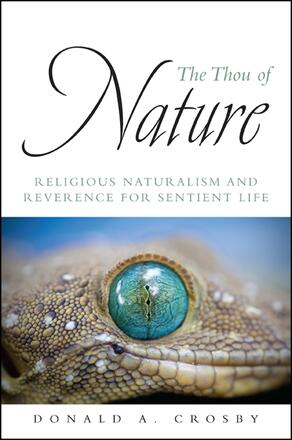
The Thou of Nature
Religious Naturalism and Reverence for Sentient Life
Alternative formats available from:
Explores the spiritual obligations of humans to animals from a religious naturalist’s perspective.
Description
Humans share the earth with nonhuman animals who are also capable of conscious experience and awareness. Arguing that we should develop an I-thou, not an I-it, relationship with other sentient beings, Donald A. Crosby adds a new perspective to the current debates on human/animal relations and animal rights—that of religious naturalism. Religion of Nature holds that the natural world is the only world and that there is no supernatural animus or law behind it. From this vantage point, our fellow thous are entitled to more than merely moral treatment: protection and enhancement of their continuing well-being deserves to be a central focus of religious reverence, care, and commitment as well. A set of presumptive natural rights for nonhuman animals is proposed and conflicts in applying these rights are acknowledged and considered. A wide range of situations involving humans and nonhuman animals are discussed, including hunting and fishing; eating and wearing; circuses, rodeos, zoos, and aquariums; scientific experimentation; and the threats of human technology and population growth.
Donald A. Crosby is Professor Emeritus of Philosophy at Colorado State University. He is the author of Faith and Reason: Their Roles in Religious and Secular Life; Living with Ambiguity: Religious Naturalism and the Menace of Evil; A Religion of Nature; and The Specter of the Absurd: Sources and Criticisms of Modern Nihilism, all published by SUNY Press.
Reviews
"There is a significant amount of literature in the fields of animal ethics and environmental ethics. A large subset of this literature is from a theistic point of view. Crosby's work is unique in that he comes at these issues from the perspective of 'religious naturalism. ' Both words are necessary in that his approach is nontheistic yet very much concerned with reverence for value in nature, in general, and for value in nonhuman animals, in particular. It is a significant contribution to the scholarly community. " — Daniel A. Dombrowksi, author of A Platonic Philosophy of Religion: A Process Perspective